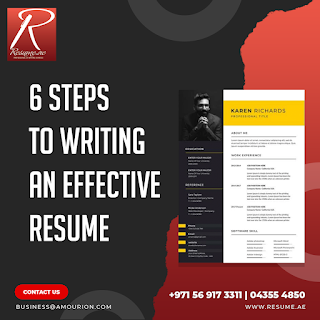www.resume.ae (056 917 3311)
One of the most important pieces of document
that needs to be drafted and updated regularly in a career-oriented person’s
life is his resume. More commonly, fresh graduates are faced with the debacle
of drafting obsolete resumes, which may render them lazy or outdated in the
employer’s eye. According to JobSeekers.com, about 75% of
the applicants’ resumes are rejected by hiring managers on a daily basis. Some
of the common reasons for this occurrence are the lack of grammatical
knowledge, inability to remain up to date with the trending CV styles,
falsified details, and much more. Let us look at some of the most common
mistakes aspiring applicants make while constructing resumes:
1. Recurrent Spelling & Grammatical
errors
Many HR managers exclaim the number of resumes
they receive, which either have poor grammatical structures or are simply not
proofread for spelling errors. This habitual action creates a negative impact
on the potential candidate’s impression because such mistakes are deemed as
“lazy mistakes,” and the recruiting managers are often left wary of the
applicant’s prospective future in the company.
Thus, in order to avoid such blunders from
recurring in the future, applicants are advised to print out the resumes and
proofread them at least twice, before submitting a job application. When CVs
appear in printed paper form, there is more scope to catch the hazardous
slip-ups, that may endanger an individual’s career prospects.
2. Amplify the Truth
While the entire purpose of a resume is to
sell yourself, i.e., your skills and capabilities to the employer, the
applicants at large are engrossed with the trend, that is to over-exaggerate
their skills or achievements. Now, hiring managers commonly mention that
exaggeration up to an optimal amount in one’s CV is normal, however, there are
certain candidates that downright state falsified truths, in the anticipation
of getting selected amongst the pool of applicants. This becomes a prevalent
issue when the hiring manager questions the applicant on one of his/her/their
caked-up skills, and the latter participant of the interview is unable to
perform as promised.
In order to avoid such embarrassing instances,
candidates should more likely supply their CVs and resumes with information
that is cent percent true. If a candidate feels strongly about an individual
skill or achievement, then he/she/they need to acquire the necessary knowledge
and capacity to back the skills mentioned on their resumes.
3. Poor Formatting
One of the classic issues faced by recruiting
employers while receiving the resumes in a paper is the poor formatting of the
layout produced in the CV. Not only does this create a sense of alarm amongst
the employers, being that the potential candidate may be heedless, but it also
supplies them with an immediate impression of the candidate’s methodical
skills. However, applicants voice that while their CVs are displayed in the
desired layout on the PC screen, they are usually unaware of the shifting
columns, rows, and information while the same CV is being printed out. They
rarely pay attention to their resumes in hand.
To avoid such formatting issues, HR managers
advise candidates to recheck the layout of their resume on paper, audit the
placement of the information provided in the CV, before handing it out to the
prospective employer. A disorganized resume undersells the candidate’s skills
and expertise, as well as endangers their potential to be selected for an
interview.
4. Personal Profile Lacks Originality
According to the managers at LinkedIn, the
majority of the resumes they receive are poured with copious amounts of cliches
such as “I am a team player” or “I am a hardworking driven
individual” …etc. Overused phrases as such throw off the professional vibe
the candidate is attempting to convey through his CV. Also, with limited
originality supplied in the resume, the hiring managers are ambiguous about the
true nature and persona of a candidate. Hence, they may quickly get bored and
move on to the next application.
Advertising yourself through a resume is
essential. Thus, recruiting employers to offer pieces of advice that revolve
around the notion to “stop copy-pasting cliches,” and rather advertise yourself
through your ideas, values, and experience in the personal profile section of
the resume. This will enable the recruiter to view you as a person, both
personally as well as professionally. It enhances the candidate’s chances to
get selected.
5. Making the Resume too Long
The general consensus regarding the length of
the resume is that, while it should be at least one page, it should not exceed
a maximum limit of two pages. Then again, hiring managers mention that the CV
length varies according to the professional level of the candidates. This means
that, while proficiently experienced candidates may acquire a two-to-three-page
resume (ex: doctor, professor, etc.), an applicant that acquired only
entry-level experience, should construct a CV that is not more than one page
long.
Injection of additional information such as
hobbies, interest, are not required, and all the essential information needed
by the employer should be supplied on the first age of the CV, in an organized
and efficient manner. Lengthier CVs may bore the recruiters. Thus, only
integral, and objective information concerning the candidate’s bio, education,
skills, and experience need to be included.
Since
there are several aspects to be considered while writing a CV, there are
certain experts in the field that can make this job easy for you. Check out Resume.ae and get
premium quality resumes drafted only for you.



